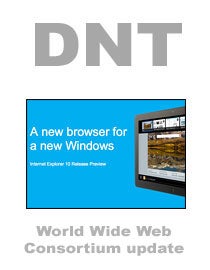 Members of a key online standards body are hashing out what to do about Microsoft’s controversial decision to ship Internet Explorer 10 with the Do-Not-Track setting turned “on” by default.
Members of a key online standards body are hashing out what to do about Microsoft’s controversial decision to ship Internet Explorer 10 with the Do-Not-Track setting turned “on” by default.
On a conference call yesterday, representatives of three member companies in the World Wide Web Consortium’s (W3C) “tracking protection” working group argued forcefully that Microsoft’s position, if sustained, would void websites’ obligation to honor DNT signals issued by the IE 10 browser. Google, Yahoo, and Adobe made the case that sites and networks should be entitled to ignore the IE 10 tracking opt-outs.
The working group is tasked with, among other things, creating specifications for how DNT should be implemented by browser makers; and implicit in that mandate is the question of how consumer tracking preferences are treated by websites and ad networks. The group includes browser makers, publishers, ad industry associations, and privacy advocates.
Aside from the tough position staked out by Google, Yahoo and Adobe, a broader consensus emerged on the call that DNT users must explicitly consent to issue a tracking signal. Thus the pre-selected DNT setting Microsoft has planned for IE 10 (already live in the preview version) would be considered non-compliant. That, according to working group member Jonathan Mayer, is not the same as saying IE 10 preferences can be disregarded.
“There was no agreement that it’s OK for companies to ignore Do Not Track requests,” said Mayer, a Stanford University graduate who has been active around privacy and online tracking issues.
Mayer, along with two other working group members – Electronic Frontier Foundation’s Peter Eckersley and Mozilla’s Tom Lowenthal – have put forth a compromise proposal which states, “Any ordinary user agent MUST NOT send a Tracking Preference signal without a user’s explicit consent.”
“We want to show just how serious we are about getting this thing done, and working with industry to get it done in this multi-stakeholder process,” Mayer added.
The Wednesday call was a tee-up for an upcoming meeting in Seattle, scheduled for later this month. An email from working group co-chair Aleecia sent to other members of the group – and obtained by AdAge – stressed the meeting’s importance:
“It would be useful for you to understand where your organization stands on predictable key issues. In many places we are seeing executives getting involved in new ways. Please make sure you have as much information as possible about what your organization can live with before you walk through the door. We are looking for major decisions.”
Looming over the W3C discussions and the Microsoft situation is an increasingly urgent European regulatory process. Several EU countries are hitting important deadlines for compliance with the pan-European cookie directive. And in the U.S., advertisers are highly sensitive to the risks of self-regulatory disarray – the worst case being a recommendation by the FTC that Congress legislate an answer to the online tracking issue. As Bob Liodice recently put it to AdExchanger: “If we end up with a situation where we have inconsistent behavior by the industry where consumers’ wishes and desires are not translated into action that reflect their needs and wishes, then we’re only going to invite the government to step in and order us to.”
While Microsoft’s position and the demands of industry would seem to be in stark contrast to each other, the Redmond company does have options other than a total walk back from its current plan. A more realistic alternative might be that users installing its browser would see a prompt window asking them to make a choice about ad tracking.
“There’s huge pressure to get this done, or at least to get sufficient high level agreement that everything’s going to get done in the Seattle meeting,” says Stanford’s Mayer.
By Zach Rodgers












